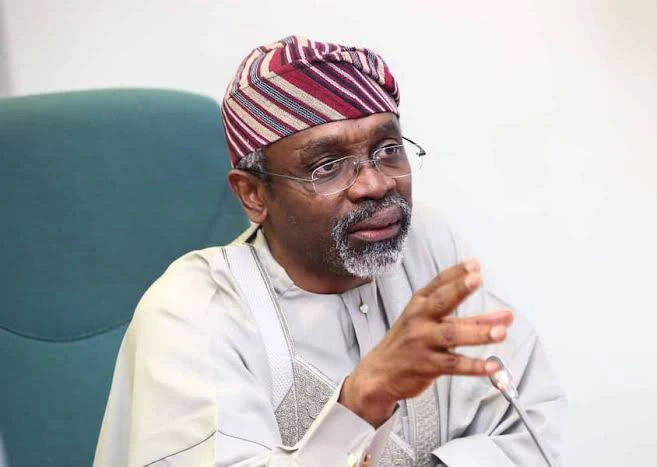Nigeria’s outgone Speaker of the House of Representatives and current Chief of staff to the President, Femi Gbajabiamila has openly lamented that too many young Nigerians have lost faith in the country and are choosing in droves to seek their fortunes and futures in other lands.
Gbajabiamila decried that this trend has ensured that the country was losing some of her best and brightest. He pointed out that if the leaderships at all levels do not act now, the consequences of this loss will shortly become painfully evident.
The former speaker who spoke at the valedictory session of the 9th House of Representatives, also said the prominent achievements of the House in the last four years were the Petroleum Industry Act (PIA), the Electoral Act, 2022, and Police Reforms Act.
Gbajabiamila said while the strategic importance of the oil and gas sector to Nigeria’s socioeconomic well-being has long been apparent, successive administrations failed to put in place a functional statutory regime to allow that sector to function optimally.
He said the 9th Assembly ended that legacy of lethargy with the passage of the Petroleum Industry Act, the Deep Offshore and Inland Basin Production Sharing Contracts Act which further put the sector on the right footing.
‘These statutory reforms rightfully ought to have happened a long time ago. Now, we must ensure that the reforms contained in these Acts are dutifully implemented as part of a broader energy policy suited to the realities of technological advancements and the evolving demands of the global energy market,’ the outgone speaker said.
Read Also: Real Reason Many Good Lawmakers Were Voted Out – Gbajabiamila
Gbajabiamila noted that the House passed the Police Act to change the nature of relations between the police and citizens in the country and ensure that police officers who fall short of their responsibilities can be quickly held accountable.
‘The Act expressly prohibits police officers from arresting citizens for civil wrongs, imposes an obligation on the police to inform citizens of their rights at the point of arrest, and mandates the police to ensure that persons arrested have access to their families and legal representation.
‘In addition, the Act established the Police Complaints Units as a statutory organ accessible to the public to report police misconduct and empowered to initiate action when such reports are received,’ he said.
The speaker also said the 9th Assembly appropriated the sum of N500 million through the National Human Rights Commission (NHRC) to compensate victims of police brutality nationwide.
He said also that the House provided timely intervention to curb the adverse impact of the COVID-19 pandemic through the passage of the Emergency Economic Stimulus Bill to grant companies rebate on Companies Income Tax, suspend import duties on medicines, and the Emergency Relief and Assistance Bill to provide a limited salary guarantee for low-income permanent employees of companies registered and operating in Nigeria.
Gbajabiamila said while these legislations did not pass in the Senate and never became law, they provided the framework for the Federal Government’s policy response to the pandemic, as the policy ideas contained therein were adopted and variously implemented through executive orders and subsequent legislations.
The speaker said the House also worked to establish, under emergency conditions, a fully functioning care facility in the Federal Capital Territory under the management of the National Centre for Disease Control (NCDC) and intervened to prevent potentially devastating strike action by doctors.
He said the legislative legacy of the 9th House includes the Companies and Allied Matters Act and the Nigeria Start-Up Act, two critical legislations aimed at changing the way business is done in Nigeria by streamlining regulations, reducing red tape, and setting the conditions for the private sector to innovate, thrive and grow.
“Our legacy also includes the comprehensive electoral reforms in the Electoral Act that have changed forever for good the way we conduct elections in Nigeria. While we recognise the need to continue to work to improve election management in Nigeria, we must acknowledge the vast improvements that have happened since the return to democracy. And we take pride in our contribution to these improvements over the last four years.
“Through the constitutional review process, the House of Representatives sought to restructure our government to make it more effective, reorganise our politics to make it more inclusive, enshrine efficient mechanisms for holding the institutions of state to account and put an end to the debilitating conflicts that even now continue to tear our nation apart.
“We made an audacious attempt to create a constitution that addresses once and for all the fundamental issues that distract from nation-building. The constitutional amendments we enacted devolved power and responsibilities over critical areas of our national life in an effort to spur innovation and healthy competition at the subnational level.
“By our joint effort, we achieved financial independence for state Houses of Assembly and state judiciary, granting greater autonomy to these arms of government in line with democratic best practice,” Gbajabiamila stated.
He regretted that the 9th Assembly did not succeed in removing some of the constitutional barriers that have long stood in the way of women’s full and unhindered participation in the politics, governance and economy of the nation and urged the 10th House to take up the mantle and do better.
Gbajabiamila also said the 9th House, with unwavering courage and determination, defended the rights and dignity of the Nigerian people abroad from every attempt to dehumanise and victimise them.

